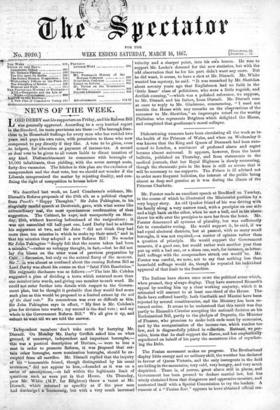We described last week, on Lord Cranbome's evidence, Mr. Dismeli's
Reform proposals of the 25th ult. as a political chapter from Punch's "Happy Thoughts." Sir John Pakington, in his singularly candid speech at Droitwich, gave, with what seems like extraordinary zeal, the most spontaneous confirmation of that suggestion. The Cabinet, he says, met unexpectedly on Mon- day, 25th, without knowing beforehand of the resignations ; it was not assembled till half-past one, Lord Derby had to address his supporters at two, and Sir John "did not think they had more than ten minutes in which to make up their mind," and in that ten minutes they adopted a new Reform Bill! No wonder Sir John Pakington "deeply felt that the course taken had been a mistake,"—rather an unhappy thought, in fact,--but he did not lay the blame on the utter want of previous preparation by Cabi , discussion, but only on the natural flurry of the moment. Sir:. m was almost as confused about the coming Reform Bill as Lord Derby was about his course on that "fatal Fifth Resolution." His enigmatic disclosure was as follows :—" The late Mr. Cobden suggested a plan of dividing a town which returned more than one member into wards, and giving one member to each ward. He could not enter further into details with respect to the Govern- ment plan, but he thought it probable that they would find some such plan as this would be proposed to a limited extent by the aid of the dual vote." No conundrum was ever so difficult as this. Sir John Pakington says in effect, "My first is Mr. Cobden's plan for division into wards ; my second is the dual vote ; and my whole is the Government Reform Bill." We all give it up, and submit to wait till we are told the answer.






























